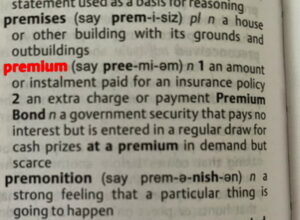 Betfair is one of the biggest betting companies in the world, largely thanks to the fact that offering peer-to-peer betting services is unique. If you want to place a bet that isn’t just what all of the other bookmakers are offering and you want the odds to be competitive, betting on the exchange is one of the only things that you can do.
Betfair is one of the biggest betting companies in the world, largely thanks to the fact that offering peer-to-peer betting services is unique. If you want to place a bet that isn’t just what all of the other bookmakers are offering and you want the odds to be competitive, betting on the exchange is one of the only things that you can do.
For the company itself, the way that it makes money is by taking a percentage of the winnings from the punter that enjoys success in their bet. The good news is that it provides a nice steady income, but the bad news is that it limits how much money Betfair can make.
The fact that exchanges aren’t exactly huge money makers is why so few companies offer one. For Betfair, therefore, there was always a need to try to find other ways to ensure that their income was competitive. Whilst they moved to introduced a regular sports book, online casino and other products, the exchange was still their biggest income generator and where they felt they could make more money somehow.
In 2023, the Betfair Premium Charge was introduced, which saw the biggest winners charged an extra amount on their winnings that customers weren’t happy about.
Understanding Betfair’s Money-Making Method
 When it comes to Betfair, we first need to get our head around how the company makes money generally to understand why it felt the Premium Charge was necessary.
When it comes to Betfair, we first need to get our head around how the company makes money generally to understand why it felt the Premium Charge was necessary.
When it was launched at the start of the online betting craze, Betfair was purely an exchange platform. This meant that it acted as a middleman, putting bettors in touch with each other and facilitating their betting in a safe and secure environment. In order to make a profit themselves, they took 5% of the winning bettor’s money, which was a commission taken for playing the role that they did in the process.
In the years that followed, Betfair’s popularity grew and it made plenty of money thanks to its 5% commission fee. It joined forces with Paddy Power and eventually it launched a sports book of its own, allowing them to benefit from those that wanted to place bets with them but couldn’t get their heads around how the exchange worked.
This gave the same sort of profit as other bookmakers, but the small margins taken from its most popular platform, the exchange, will still have given those in charge of the companies headaches. It was a finite resource, so how could they improve their take?
The Premium Charge
 Thanks to the way that the exchange worked, some customers were able to make huge profits from others whilst only paying a commission of 5%. Imagine you’ve just won £100,000, you’ll only need to give Betfair £5,000 and take the other £95,000 home. As a result, Betfair decided that it needed to do something in order to make more money from the successful customers.
Thanks to the way that the exchange worked, some customers were able to make huge profits from others whilst only paying a commission of 5%. Imagine you’ve just won £100,000, you’ll only need to give Betfair £5,000 and take the other £95,000 home. As a result, Betfair decided that it needed to do something in order to make more money from the successful customers.
What they came up with was the Premier Charge, which they decided would only be payable by those that were making the most money from betting on the exchange, with the following being the rules:
- Those in profit over the life of their Betfair account pay the Premium Charge
- Those that had paid less than 20% in ‘total charges’ during the time using the exchange pay it
- Anyone betting on more than 250 markets in total have to pay it
It might be unfair to say that Betfair intentionally made the Premium Charge confusing to understand, but it is definitely true that a lot of people don’t really understand it and have no idea if they are the sort of people that have to pay it.
Explaining the Premium Charge
 The Premium Charge isn’t something that it is necessarily all that easy to understand in terms of how it works. In essence, it exists in order to bring the total amount that successful bettors have to pay on their winnings to 20%. That is the simple explanation, but it is worth pointing out that it isn’t really ‘simple’ at all.
The Premium Charge isn’t something that it is necessarily all that easy to understand in terms of how it works. In essence, it exists in order to bring the total amount that successful bettors have to pay on their winnings to 20%. That is the simple explanation, but it is worth pointing out that it isn’t really ‘simple’ at all.
How much you’re winning is the dictating factor when it comes to the amount of Premium Charge you’ll need to pay. To add confusion into the discussion, it’s possible that you won’t even have to pay it at all if one win makes up more than 50% of your gross wins.
There is a lifetime allowance of £1,000 in fees, which needs to be paid before any Premium Charge will begin to take effect. In other words, if you’ve been paying 5% of your winnings and the amount that you’ve paid to Betfair in fees for their commission adds up to, say, £600, you’ll need to pay another £400 in fees before you need to worry about the Premium Charge.
They will get in touch with you before they charge it, so it won’t be a surprise, and the company itself suggests that only 0.5% of all customers even end up having to pay it in the first place.
If you meet the requirements, you will be charged either the difference between 20% of the gross net wins that you made on the previous week and the total charges that you’ve managed to generate during that week, or the difference between 20% of your gross net wins and the total charges that have been issued to your account during your lifetime as a Betfair customer.
Betfair treats all accounts as though the Premium Charge has been in play since the company launched in 2000, which certainly doesn’t help in terms of clarity around who has to pay the charge.
It isn’t A Clear Thing
 The simple truth about the Betfair Premium Charge is that it’s confusing. There is no point talking about it and acting as it it is a really easy thing to get your head around, because it isn’t. Picture a work in which you’ve won £1,000 during the week. In isolation, this mans that you’ll have to pay the Betfair Premium Charge, losing £200. If you’ve already paid 5% commission then that comes down to £160, as the £40 you paid will be reduced. The £160 is to take the total amount paid up to 20%, as opposed to just paying 20% outright. The more you win, the higher the figure you need to pay.
The simple truth about the Betfair Premium Charge is that it’s confusing. There is no point talking about it and acting as it it is a really easy thing to get your head around, because it isn’t. Picture a work in which you’ve won £1,000 during the week. In isolation, this mans that you’ll have to pay the Betfair Premium Charge, losing £200. If you’ve already paid 5% commission then that comes down to £160, as the £40 you paid will be reduced. The £160 is to take the total amount paid up to 20%, as opposed to just paying 20% outright. The more you win, the higher the figure you need to pay.
If you were to earn £250,000 or more, for example, you might need to pay as much as 60% on your winnings. The confusion is made worse by the manner in which Betfair treats the commission that you’ve paid. A payment of 5% on your bets is treated as 2.5% of the ‘total charges’ that Betfair issue. At that point, they’ll add charges of 17.5% in order to bring the total amount up to 20%. In accordance with the Betfair Premium Charges rule, though, that actually then comes to 22.5%. The only good news is that, unless you’re making a lot of money out of Betfair, you probably don’t need to worry about the Premium Charge.
As an example, imagine that you’ve made net wins of £16,429.31 from Betfair across the course of your lifetime betting with the company. In order to do that you bet on 3,165 markets and you paid total charges of £4,671.32. That means that you’ll have paid around 28% in total charges, meaning that you will not have to pay the Premium Charge. If you win more and don’t pay large charges, however, you might drop below the 20% mark in total charges paid, meaning that you’ll then be liable to pay the Premium Charge as per Betfair’s terms and conditions on the matter.
Told you it was confusing.
Is There A Way To Avoid Paying It?
 Any bettor worth their salt will obviously want to know what it is that they can do, if anything, to avoid paying the Betfair Premium Charge. The short answer is that you can’t avoid it, presuming you want to keep placing your bets with Betfair and using the exchange.
Any bettor worth their salt will obviously want to know what it is that they can do, if anything, to avoid paying the Betfair Premium Charge. The short answer is that you can’t avoid it, presuming you want to keep placing your bets with Betfair and using the exchange.
You could change the style that you use for your betting in order to not win as much money, but that feels like a silly approach if you’re still liable to make more money paying the Premium Charge than you would if you didn’t win enough money to be hit with it in the first place, if that makes sense.
The other thing you need to bear in mind on that front is that Premium Charge avoidance is specifically prohibited in the terms and conditions of Betfair, so if you’re caught trying to get out of paying it then you might find that your account is suspended or even closed down altogether. As a result, one of the only ways that you can stop yourself from having to pay the Premium Charge is by placing your bets on a different exchange. The problem with that, of course, is that Betfair accounts for around 80% of the market share of exchange bets, so do you really want to?
Betfair’s liquidity is a big part of its appeal, with said liquidity only coming thanks to its huge market share. As a result, other online betting platforms that offer exchanges don’t have the same liquidity, so if you’re the sort of person that would be placing bets big enough to mean that the Premium Charge might be a problem, you might not be able to place them with any other betting firm.
Do you want to place much smaller bets in order to avoid paying the Premium Charge, or accept that the Charge is the cost of doing business with the best platform out there for the sort of bets you want to place?
Customers Don’t Like It
 Unsurprisingly, Betfair’s customers are not fans of the Premium Charge. Even aside from the fact that it is very difficult to understand how the thing works in the first place, it is generally seen as a greedy move to make as much money as possible from a company that already makes plenty.
Unsurprisingly, Betfair’s customers are not fans of the Premium Charge. Even aside from the fact that it is very difficult to understand how the thing works in the first place, it is generally seen as a greedy move to make as much money as possible from a company that already makes plenty.
The fact that Betfair initially made its name and won its customers thanks to the fact that it was seen as ‘sticking it to the greedy bookmaker’ doesn’t make it any easier for punters to swallow the bitter pill of giving them more money. Message boards are awash with people calling it a disgrace.
The problem is, there is very little that punters can do about it. Yes, they can take their business elsewhere, but unless there is a coordinated effort to move everyone away from Betfair and to one of their rivals, which would be all but impossible to organise, the liquidity is going to remain with the company and there is nothing that can be done about it.
There is also nothing to stop the company that everyone moved to from introducing a similar charge, such is the desire of such companies to make as much money as physically possible, so customers have to like it or lump it.
